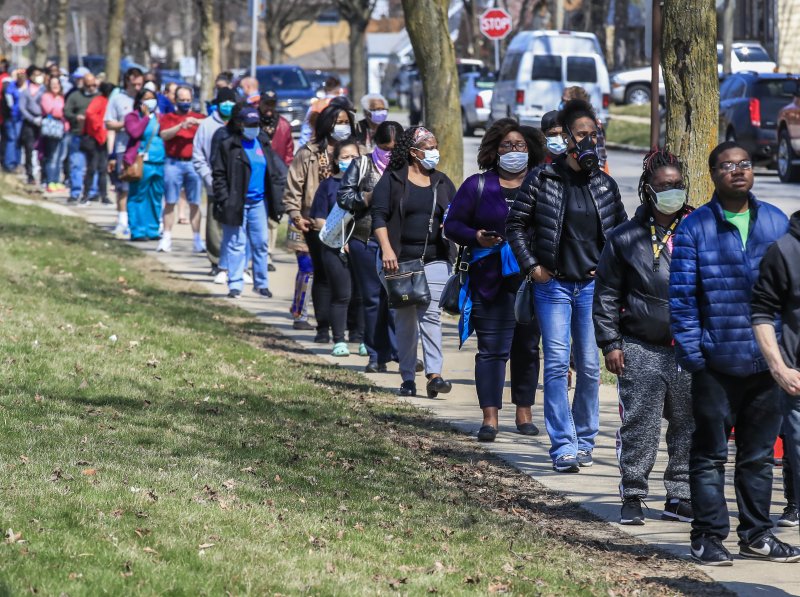1 of 2 | Voters wait in line to cast their ballots in the Wisconsin presidential primary election at Marshall High School in Milwaukee on April 7. Photo by Tannen Maury/EPA-EFE
April 16 (UPI) -- Last week's election in Wisconsin was a total failure of leadership. No one should ever be forced to choose between going to the polls and risking coronavirus infection, or staying home and forgoing the basic right to vote.
Yet despite the clear threat to public health and to our democracy, about 300,000 Wisconsinites confronted that very choice and decided to get out and vote. The full extent of the damage, both to human health and voter participation, may never be known.
What is abundantly clear though is that with a bit of foresight and planning, this could have been avoided. Elected officials in Wisconsin and across the country should act now to avoid repeating the same mistakes.
States have a constitutional obligation to provide all voters the opportunity to participate in elections safely. But for too many Wisconsinites, the long lines and packed polling places, as well as the confusing and (up until the eve of election day) constantly changing absentee voting policy, casting a vote under the life-threatening cloud of a deadly disease seemed too dangerous. That can't happen again.
The COVID-19 outbreak has exposed a gaping hole in our election systems. Very few states have established voting procedures to withstand the public health emergency that a pandemic presents.
Over the past weeks, we've seen states scramble to come up with ways to safely run elections. Some states, including Maryland, were successful. Republican Gov. Larry Hogan decided weeks ago to turn his state's April 28 special congressional election in Baltimore into a vote-by-mail contest, and to postpone the state's spring primary to June.
Of course, safe, secure elections can't happen overnight. It takes time -- as well as money and infrastructure -- to print ballots, mail them to voters, staff polling places and implement systems for tracking and counting votes. With that in mind, every state has an opportunity and obligation to learn from the debacle in Wisconsin and start work now to quickly establish plans for resilient elections come November.
Fundamentally, each plan should ensure that every voter is able to access and cast their ballot safely, even if the novel coronavirus persists. More specifically, states must untether themselves from the traditional voting model -- the idea that everyone votes on one day at one place.
We need to create more space, both literally and figuratively, for people to engage in the election process. One of the best ways to do that is to expand access to voting by mail, up to and including having the emergency option to mail every eligible voter a ballot directly.
Vote by mail isn't perfect; there is real value in a private voting booth. But
during a pandemic, the advantages and necessity of emergency universal vote by mail are clear. If by November, allowing thousands of people to congregate at the polls still presents a public health risk, states need to have the ability to directly mail all registered voters an absentee ballot. This would allow them to make their voices heard from the comfort and safety of their own homes.
In addition to expanding voting by mail, states should expand access to voter registration, adjust deadlines and make plans to accommodate voters for whom voting by mail doesn't work. Building out all of these systems will require additional infrastructure and a robust public education effort.
The smart thing to do is to plan for a Nov. 3 when COVID-19 is continuing to make crowding in public places unsafe. That planning needs to start today. Seven months from now, there will be no excuse for elected officials caught unprepared.
Joe Ready is the democracy program director at the U.S. Public Interest Research Group, the network of state organizations that use research, grass-roots organizing and direct advocacy to advance the public interest. This article originally appeared at The Fulcrum.
A poll worker gives disposable plastic gloves to a voter at a polling station in Seoul during South Korea's parliamentary elections on Wednesday. Photo by Thomas Maresca/UPI |
License Photo
















